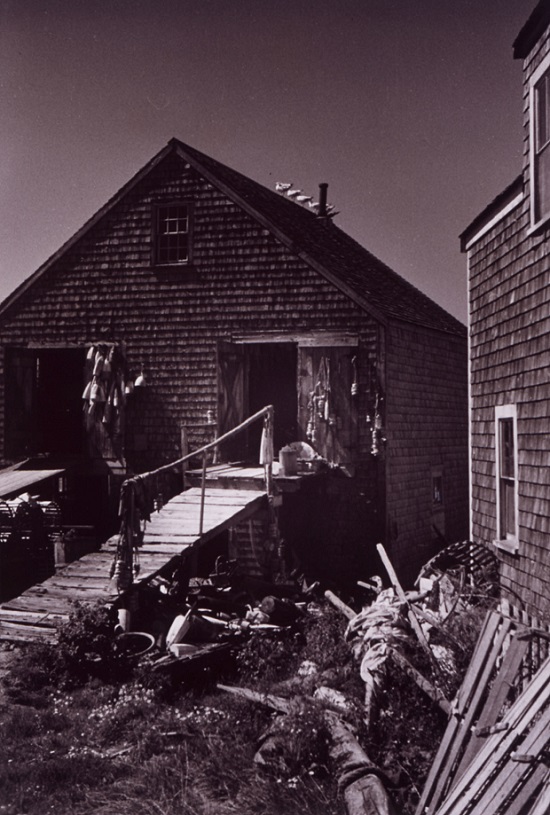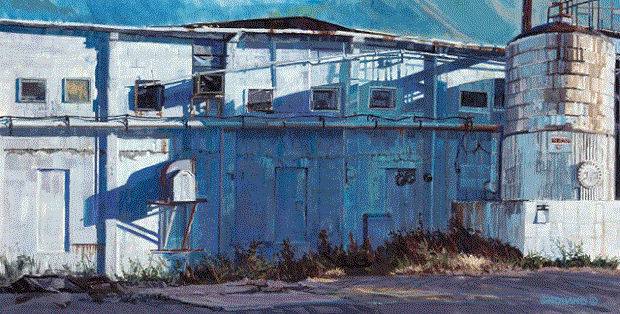
Birches and elms
"Birch Trees #1,'' (raku ceramic), by NANCY CAHAN, at Alpers Fine Art, Andover, Mass.
Because of innumerable paintings, photos and such poems as Robert Frost's "Birches'', the birch tree is deeply associated with ideas about the New England countryside (and canoes), as are elms with the region's streets. But climate change might dramatically reduce the number of such trees, and confine them to New England's most northern sections.
Meanwhile, recent botanical research has led to the development of fungal-disease-resistant American elms (see one below), which Dutch elm disease seemed to utterly doom only a couple of decades ago. We all look forward to the return of these graceful , hourglass-shaped trees to the commons and street sides of New England towns where they were so common 60 years ago. I'm sad I won't be around to see them as tall as I remember the trees, now long dead, as a boy.
I recall Memorial Day parades under the elms and think of their iconic position in New England whenever I hear the Eugene O'Neill play "Desire Under the Elms'' mentioned.
Conn. vs. Fla. may be equal contest
By CHRIS POWELL MANCHESTER, Conn. With snowstorms seeming to arrive every few days, little room left for stacking the snow, road-salt supplies nearly exhausted, state and municipal snow-removal budgets in deficit, and the Connecticut General Assembly reconvening, many people in Connecticut feel that they have had enough of the state. It's little consolation to them that Connecticut may have the best snowplowing operation in the country, with the state's major roads almost always kept passable throughout even the heaviest snowstorms. For besides the extra snow, Connecticut's economy and standard of living are still declining, which may be the cause of most of the surliness here; the snow just makes people feel their resentments more keenly. As a result many of them look south enviously, especially to subtropical Florida, to which many Connecticut residents already have fled, either permanently or just for the winter. Indeed, when the University of Connecticut's basketball teams play colleges in Florida, the crowd often seems to favor the visitors. But while it may be harder to appreciate Connecticut after shoveling snow or falling on ice, Florida has its own climate disadvantages. In the late summer and early fall Florida can be crossed by as many hurricanes as Connecticut suffers snowstorms in the winter, and the resulting property damage in Florida is far greater than that inflicted by snowstorms in Connecticut, just as weather-related electricity outages in Florida can last longer. Because of bad weather a few weeks ago it took three days and several flight reschedulings for a recently retired couple from Connecticut to escape the state by air for their new winter home in South Florida, one of those tightly regulated condominium complexes that forbid admission to anyone under 55. The couple had hardly begun breathing the state-income-tax-free air when a line of thunderstorms stalled overhead for 24 hours and dumped 14 inches of rain on them, flooding their new neighborhood, closing its roads, and incapacitating sewer lines and toilets for a couple of days. It wasn't a snowstorm; it was worse. Not long after the couple got dried out and settled, some university researchers reported that alligators, which which infest South Florida, not only swim stealthily but also climb trees, in part for better surveillance of their prey. Told of the study, the new arrivals from Connecticut refused to be concerned. While they had not yet read their condo association's many rules, they figured that, in addition to excluding people younger than 55, there was probably one against alligators climbing trees on the property and eating the residents. They shouldn't count on it. Annoying as Connecticut's snow has been, at least it also has gotten in the way of the state's own many predators, both those with four legs and those with two. There's never much crime in bad weather. * * * Two executives of the Metropolitan Transit Authority came to Hartford last week so Gov Dan Malloy could reprimand them in front of the television cameras about the MTA's mismanagement of the Metro-North Commuter Railroad, whose many recent disasters have impaired service from New Haven to Grand Central Station in New York. The MTA executives duly promised improvements soon. But while the governor got to look tough, he really didn't increase Connecticut's leverage with the MTA, a New York state agency paid by Connecticut to operate the state's rail lines into New York. To gain such leverage Connecticut needs a plan, just as Metro-North needs a plan to improve rail service. Connecticut's plan might include demanding representation on the MTA's board, the renegotiation of Connecticut's contract with the MTA, and a study of how Connecticut could take over the management of its rail lines into New York. Until Connecticut has a rail-service-improvement plan that goes beyond scolding MTA officials on television, the MTA may assume that it can take its time about improving service here. Chris Powell is managing editor of the Journal Inquirer in Manchester, Conn. Please respond to www.newenglanddiary.com via rwhitcomb51@gmail.com.
On Monhegan
"Untitled'' (gelatin silver print, 1936), by GEORGE DANIELL, in the show " Picturing Monhegan Island,'' March 1--Aug. 3, at the Portland Museum of Art. (Picture is a gift of George Daniell and the Aucocisco Gallery, 2001.6.23 © George Daniell Archive, Dwayne and Gina DeJoy.)
The show showcases about 20 photos and drawings that Daniell created on the famous artists' haunt of Monhegan Island, far off the coast of Maine, in the summer of 1936. The stark beauty of the island, and the sadness of Depression-era America, come out in these beautiful pictures.
Philip K. Howard: Shipwrecked on ancient laws
By PHILIP K. HOWARD NEW YORK
A shipload of salt to deal with this year’s snow and ice on New Jersey’s roads has been detained in legal limbo in Providence Harbor, en route from Maine. The problem, detailed in the Feb. 19 New York Times, is that it’s illegal for a foreign-owned vessel to ship goods from one U.S. port to another. (There’s even a word for it, I learned. Domestic shipping is called "cabotage.")
Now, there’s nothing apparently wrong with the ship, which had just finished unloading its cargo in Maine and was available to take on the salt immediately. But an obscure 1920 law known as the Jones Act requires a U.S. ship, with a U.S. crew, on all domestic routes. There’s a cottage merchant marine industry and union that exists just because of this law.
In this era of free markets, one would think that protectionist laws from almost 100 years ago would have gone the way of the horse and buggy. But laws have remarkable staying power (as we saw two weeks ago with the continuation of New Deal-era farm subsidies). The same onerous process for enacting a law applies to repealing it, with one additional, almost insurmountable, hurdle: the law now is surrounded by an army of special interests who will do anything to defend it (think campaign money and ad hominem attacks on would-be reformers).
That’s why, in the strange culture of Washington, repealing laws is so rare as to be almost unthinkable. Getting rid of old laws violates the laws of legislative physics.
Laws pile up, year after year, like sediment in the harbor. Society, meanwhile, is increasingly paralyzed. The U.S. now ranks 20th in the world in ease of starting a business. This is because of thousands of laws like the Jones Act.
American democracy has a structural problem: There’s no political or legal imperative to clean the stables. The accumulation is so bad that, as I argue elsewhere, America should initiate a series of commissions, area by area, to recommend what are known as "recodifications" of law—new, simpler codes that reflect current national goals and priorities. Going forward, most regulatory programs should periodically "sunset," with an action-forcing mechanism (perhaps a constitutional amendment) that prevents Congress from simply re-enacting the same program in a midnight vote.
It’s impossible to run a government, much less balance public budgets, under the weight of a hundreds of laws and programs that are obsolete in whole or part. The weight grows heavier every year. It will break, sooner or later. Perhaps it’s time to start thinking about to fix it.
Philip K. Howard is a New York-based lawyer, civic leader and author. He is chairman of the legal and social-reform group Common Good and the author of , among other books, The Death of Common Sense and the upcoming The Rule of Nobody.
'Lame Deer' and 'culled' ones
"Lame Deer (Big Eagle)'' (oil on French linen), by ROBERT S. NEUMAN, in the "Robert S. Neuman: Lame Deer Series,'' at the Art Complex Museum, Duxbury, Mass., Feb. 23-May 18.
Soon there will be many fewer deer on Block Island, as a Connecticut firm is being brought in to "cull'' the herd, whose population, and that of the deer ticks that carry Lyme disease, have swollen. Brutal world.
Of factories, Florida and Alzheimer's
Many citizens wonder what to do with 19 acres of Providence land that have been made available for development by moving Route 195. What a huge opportunity!
The property is in the middle of New England’s second-largest city; alongside the East Coast’s “Main Street” — Route 95 — whose intersection with 195 created one of the East's big crossroads; next to internationally known academic institutions; spectacularly situated at the head of a great bay, and near a large hospital complex. And just down the road is Green Airport, which is being expanded to allow nonstop flights to the West Coast and Western Europe.
What to put on the property? Offices and academic facilities, especially those connected with medically related activities; design businesses (Rhode Island School of Design spinoffs?), restaurants, hotels and stores. But let’s not ignore manufacturing.
This would not be the “dark satanic mills” of yore, emitting thick pollutants into the air and water. Most American manufacturing is much, much cleaner these days. It also employs fewer people, as foreign factories and robotic systems here have taken over much of the work, though the factory workers we have are generally well paid. To make such high-end stuff as pharmaceuticals in plants on the 195 land is just common sense. Consider that the proximity of Routes 195 and 95 and Narragansett Bay’s ports makes shipping manufacturing materials into and finished products out of this part of Providence remarkably easy. And there’s lots of engineering expertise in the region.
And if you think that a factory can’t co-exist attractively with a thickly settled area, consider Genzyme’s plant in the Allston section of Boston.
But the area needs more and better mass transit to serve the neighborhood, whose warren of confusing streets could scare away car-based people. Eventually a couple of trolley lines (real ones, with rails) should run through the newly developed area to connect the old downtown, the medical complex to the south and College Hill. But let development be dense; sociological and other studies associate density with lower crime and higher urban energy. Planners for the land should keep out windswept parking lots.
All in all, the 195 land offers the biggest opportunity to raise the profile and thus the prosperity of Providence since the rivers were moved.
***
We just got back from Naples, Fla., where I worked and we saw relatives in one of the most demure parts of the peninsula. The overloaded airline system makes travel to and from the Sunshine State increasingly difficult. And the urbanization and suburbanization of much of Florida have tattered much of its semi-tropical beauty. Still, the warmth, the greenery and the ease of strolling compared with walking on New England’s icy streets, narrowed by inadequate snowplowing, made it seem paradisiacal. And the quiet was addictive; the sound of wind through the palms and the surf were the main background sounds as I typed in my brother-in-law’s office.
It brought back memories of a quiet, lush Florida from my childhood. I remember the smell of the orange groves, the roadside juice stands and the long stretches of unbuilt-on beach backed only with palmettos and dune grass. My first memory is of an old man throwing bread to pelicans on the beach in Siesta Key, near Sarasota. Later ones include discovering Key lime pie and stone crab, drinking from a coconut and enjoying the best roadside kitsch in America.
Parts of my family had been going to Florida for part of the winter since around World War I. Naturally they complained about its over-development. Of course, they helped start the problem. (However, they never took part in the sort of crazy land speculation immortalized in the Marx Brothers’ 1929 film “The Cocoanuts,” in which Groucho’s character keeps trying to unload swampland on unsuspecting investors. Not much has changed since then!)
When there’s something nice, we overuse it, which is what happened to Florida, especially after air-conditioning, interstate highways and jet travel made getting and staying there so much easier. The Florida that I briefly revisited the other week, just before its high season, evoked in me balmy nostalgia for a time before Florida became a mega-state.
***
Kudos to Cape Cod-based writer/editor/publisher Greg O’Brien, 64, who has been writing (as self-therapy) about Alzheimer’s disease since he was diagnosed with it, in 2009. One of his projects is his book “On Pluto: Inside the Mind of Alzheimer’s.” Then there’s my friend Berna Huebner, whose movie and book, “I Remember Better When I Paint,” describe how her mother, a successful Chicago-based painter, regained some of her skills and energy after she was persuaded to return to painting after Alzheimer’s seemed to doom her to a life of, by turns, agitation and depressed passivity. We’d better be looking for many routes for relief for dementia victims — and their families -- as the number of victims swells in the next two decades.
(In 2010, I wrote a magazine piece about this.)
Robert Whitcomb (rwhitcomb51@gmail.com), a former editor of The Providence Journal's Commentary pages, is a Providence-based writer and editor and the overseer of www.newenglanddiary.com. He is also a director of Cambridge Management Group (cmg625.com).
Philip K. Howard: The perilous search for legal certainty
By PHILIP K. HOWARD
You will profit by reading philosopher Simon Critchley's recent reflection on Dr. Jacob Bronowski and the dangers of certainty. People who think they possess a final truth, driven compulsively towards their view of certainty, often cause evil, whether they're religious fanatics like Savonarola or, as Bronowski discusses, the officials who devised the Final Solution.
A responsible human must look life in the eye, open to the moral and factual uncertainties presented by many choices in human dealings. Critchley: "There is no God's eye view, Dr. Bronowski insisted, and the people who claim that there is and that they possess it are not just wrong, they are morally pernicious. Errors are inextricably bound up with pursuit of human knowledge, which requires not just mathematical calculation but insight, interpretation and a personal act of judgment for which we are responsible."
Applying this principle of human responsibility for moral choices has applications throughout the range of human endeavor. Let's look at law for a minute.
Legal certainty is accepted orthodoxy. Of course, law should be certain, we have been taught. Only then will people know what's expected of them, and not be fearful of arbitrary officials. In pursuit of certainty, laws have become ever more detailed. The new Volcker Rule regulating proprietary trading by banks is almost 1,000 pages long. The Affordable Care Act is almost 3,000 pages long. Nursing homes are typically regulated by 1,000 rules. In total, there are over 100 million words of binding federal law, and several billion words of state and local law.
Do all these detailed dictates achieve certainty? Of course not. Law is an unknowable jungle. Does all this law safeguard us against arbitrary officials? No, it's a legal minefield. No one can comply with it all. We're at the mercy of the state. Does all this detailed law make government a well-oiled, smoothly-running machine? HELP!! There's hardly any program, even the best of them, that doesn't waste vast resources in bureaucratic nonsense.
Public solvency is basically illegal in America. All this detailed law prevents the president, and any governor, from making the choices needed for fiscal responsibility.
Our obsessive quest for legal certainty has left our society, ironically, in a very uncertain state. The only cure is to abandon legal certainty and embrace human responsibility as the operating philosophy for most activities of government.
Canadian management theorist Brenda Zimmerman makes the distinction between activities that are "complicated"--like engineering, or rocket launches, or surgery--and activities that are "complex"--such as raising a child, or running a healthcare system. Complicated activities profit from detailed rules, checklists, and protocols. Complex activities require balance, and tradeoffs, and moral choices. Detailed rules cause failure.
Law can support a free society, I argue in my new book, The Rule of Nobody (due out in April), only when it abandons this obsessive quest for certainty. Law should instead set goals and principled boundaries, leaving room for humans to make practical and moral choices. Real people, not rules, make things happen. Automatic government is a false philosophy. Democracy is supposed to elect people to act on their vales, not to avoid them by mindlessly applying detailed rules. Of course people will sometimes abuse this trust. Look at the George Washington Bridge lane-closings. But officials there are paying the price. The worst system is one where things fail, and there's no one to hold accountable. That's what we have today: The Rule of Nobody, As Jacob Bronowski passionately explained, avoiding human responsibility is the root of much evil.
Philip K. Howard is a New York-based lawyer, civic leader and writer. He is chairman of Common Good, a nonprofit social- and legal-reform organization. Mr. Howard is the author of, among other books, The Death of Common Sense. For more of Mr. Howard's Daily posts, visit commongood.org/blog and follow him on Twitter: www.twitter.com/philipkhoward
To contact the overseer of New England Diary, please use rwhitcomb51@gmail.com
Wooden wouldn't quit
 "Dove Street'' (oil on panel), by CHARLOTTE BREED HANDY, at the Providence Art Club.
"Dove Street'' (oil on panel), by CHARLOTTE BREED HANDY, at the Providence Art Club.
The sadness and charm of an old neighborhood in an old New England city (in this case Providence). What is perhaps surprising is that so many of these old wooden houses have survived. The wind and the cold of our region have been very good preservatives.
The granny pod in the backyard
(Please comment via rwhitcomb51@gmail.com)
Real-estate trends say a lot about America’s wider economy and society — about citizens’ ambitions and insecurities and their evolving sense of place in our hurly-burly nation. So I read with great interest the Jan. 26 New York Times stories “The Gadfly of Greenwich Real Estate: Amid dozens of unsold mega-mansions, a real estate agent sees a glut of greed” and “Big Is Back (and Don’t Forget the Extras).”
The stories reminded me of how much more showy house ownership is now among the rich and near-rich than, say, 50 years ago. What mix of insecurity, exhibitionism, “irrational exuberance,” love of place, healthy confidence and speculation in all this? (Reminder: A real-estate boom caused the Crash of 2008.)
Billionaire Warren Buffett, by the way, lives in a modest house in Omaha.
But what really caught my eye was a Times story that ran back on May 1, 2012 headlined, “In the Backyard, Grandma’s New Apartment.” It’s about a mini-house called the MEDCottage — a prefab 12-by-24-foot, one-floor “bedroom-bathroom-kitchenette unit that can be set up as a free-standing structure.”
Given the aging of the population, we might be seeing far more of these dwellings than McMansions in the next couple of decades. They’re a fine idea, letting old people retain a sense of independence (albeit partly bogus) while not encumbering them with the duty of taking care of a “real” house.
But it’s doubtful that many residents of these tiny houses will build the powerful memories associated with childhood homes. For one thing, their ability to remember is fading.
Some of mine might be too, but my recollections of the house “I grew up in” on a hill near Massachusetts Bay remain powerful. The smell of the cedar closet, the dusty heat of the third floor in summer, the freezing drafts in the west-facing rooms in the winter, the troubling sound of glasses being clinked downstairs. My parents owned the house for about 20 years but because a young person’s sense of time passing is much slower than an adult’s — more of that below — it seems to me that I spent half my 66 years there. A childhood home has a powerful personality, creating a haunting and lifelong sense of place.
But now, jettisoning most of our stuff and moving into something like the MEDCottage has a growing attraction. I wonder if the buyers of our modest house would mind if we bought a corner of the (albeit small) backyard and put one of these tiny dwellings there to move into. We like the neighborhood.
***
The demonstrations in Ukraine against dictatorial and (with his family) kleptocratic President Viktor Yanukovych, pal and/or lackey of Russia’s quasi-fascist dictator Vladimir Putin, recall that given honest information, most people would choose to live in Western-style liberal democracies. While such potentates as Putin strive to ever expand their power and to quash their opposition, most Ukrainians look west for hope. The thuggery of a Putin or the Taliban can only suppress for a time people’s drive to live in the sort of society whose fullest expression is in nations dominated by Western ideals.
That’s because those ideals when implemented, however incompletely, address the deepest desires of people for dignity, for protection from arbitrary, larcenous and violent rule and for self- and civic improvement. The brute force of authoritarian regimes cannot work forever to block these desires.
Most Ukrainians want to be part of “Europe” (which really means Western and Central Europe) and not an autocratic empire — even one run by fellow Slavs.
***
We’ve had a tough winter in the Northeast so far this year. The jet stream has been screwed up, bringing us extended deep freezes, and Out West, including Alaska, record warmth.
When you’re a kid, snowstorm predictions bring joy; you don’t worry about going outside without a hat, nor about your dog not wearing a coat. (We thought that dogs were impervious to the extremes of nature.) But as you age, the inconveniences of snow and ice look more daunting; indeed, new snow can seem a layer of death. You feel the cold more and (rightly) anthropomorphize the dog’s feelings.
Still, as I wrote in my blog during last Saturday’s morning-long “January thaw,” how adults process time helps get them through winter. We know far better than the young how fast the seasons come and go. A happy reminder comes when you have the habit of walking the dog early in the morning and sometime in the middle of January you start to really notice it getting brighter earlier. Rejoice! Rejoice! However, with the caution and empathy of age, you make sure that you’re wearing a hat and the dog a coat.
Robert Whitcomb (rwhitcomb51@gmail.com and www.newenglanddiary.com) is a Providence-based writer and editor and a former editor of The Providence Journal's Commentary pages.
Chris Powell: Past time to reopen mental hospitals
By CHRIS POWELL MANCHESTER, Conn.
Catastrophes of mental illness are everywhere these days, likely increased by the economy's collapse and social disintegration. While the federal government is too paralyzed by partisanship to do anything, Connecticut state government has decided to study mental illness in children, as required by a state law passed last year in response to the school massacre in Newtown.
The study, to be supervised by the state Department of Children and Families, is to develop a plan for improving children's access to treatment. But while it may be better than nothing, the DCF study is a dodge for delay.
For what is lacking in the treatment of the mentally ill is no mystery: the mental hospitals that were closed decades ago on the pretense that smaller community treatment facilities would handle sufferers more humanely. Of course, few such treatment facilities were established, nor can they be, since few people are willing to live near one.
The same laments are heard everywhere, as they were the other night on the CBS News program 60 Minutes. A state senator in Virginia told how he could not get his disturbed son admitted to a mental hospital within the six-hour limit given to police to hold someone believed to be mentally ill. So the young man was sent back home with his father and the next morning attacked him with a knife and then shot himself to death.
Also on the program a woman from Connecticut complained that her 8-year-old daughter spent 12 days in a hospital before being sent home only to be wracked three days later by more violent urges. Meanwhile the Associated Press reported that a young man charged with murdering his mother in Deep River in December spent years going through hospitalizations, doctor visits, medications, and treatment programs.
The young man's brother said, "He was in and out of that system for four years, and all we ended up with was a disaster." Of course much of the work of DCF itself involves coddling manifestly unstable and incompetent single parents whose children are always at risk, a policy of less than halfway institutionalization that often results in serious injury or death to innocent kids. The refrain across the country and in Connecticut is that "the system" failed mentally ill people who killed someone or themselves. The complaint is valid insofar as serious treatment was not available. But as with the perpetrator in Newtown, with the Connecticut case cited by 60 Minutes, and with the Deep River case, treatment was available on a sustained basis; it just didn't work, because treatment of mental illness is not simple arithmetic.
Rather treatment confronts an often complicated combination of chemical imbalance and emotional distress.. Sometimes it can be treated well enough with drugs and therapy and sometimes it can't.
Sometimes the best that can be done over the long term is to keep people secure, medicated, and away from dangerous objects, as was done when government maintained more mental hospitals. Connecticut probably could fill two or three such hospitals immediately just with the weekly overflow of mentally ill people in general-hospital emergency rooms.
So why aren't the mental hospitals being built? And why Connecticut's concentration on mental-illness treatment for children alone? The trouble is no less profound for disturbed adults and their families. It won't do to blame big, bad insurance companies for resisting coverage for institutionalization. Of course, insurance companies are no more eager to cover mental illness than government itself is; it is often fantastically expensive and perpetual without improvement.
But only government is big enough to handle the problem. Fortunately, if Connecticut is ready to rearrange its priorities it will have the resources, since treating the mentally ill is infinitely more compelling than state government projects already underway like busways, mouse factories, burrito restaurants, and raises and pensions for government employees.
Chris Powell is managing editor of the Journal Inquirer, in Manchester, Conn.
Some real and movie time with Pete Seeger
In the late spring of 1970, a group of about a dozen of us (I was along for the ride with a girlfriend of the time) spent a few hours with the mellow-voiced Peter Seeger at his 17-acre rustic homestead, in Beacon, N.Y., on a bluff overlooking the Hudson River. It had been a lush, warm spring, famous for anti-Vietnam War demonstrations. We had a cookout, at which Seeger was an affable host. He, of course, sang and played the five-string banjo, and a few others joined in making music.
Way down below on the river was a sloop that he owned that he was using in the early stages of leading a campaign to stop the likes of General Electric and other organizations from dumping toxins (some carcinogenic) into the river (which that day, despite its poisons, looked like 18th Century painting of the Rhine. Gorgeous!). It seems astonishing now to think of what we dumped into our public water, both as individuals and as institutions.
I generally disliked folk songs back then -- the lyrics seemed too sentimental and sometimes far too preachy and the tunes repetitive and clunky. I find them easier to take these days because I hear them as part of the broad flow of history. Or maybe I'm just getting hard of hearing....
Meanwhile, take a look at this segment of the very funny and sad movie The American Ruling Class. In it, Pete Seeger is walking, banjoing and singing down a road in what seems to be a very pastoral part of Greenwich, Conn., a capital of the sometimes rapacious capitalism that the old leftie hated. I think it's pretty funny, as is much of the movie, directed by John Kirby, produced by Libby Handros and with writer/editor Lewis Lapham as the master of ceremonies. He takes us to a lot of other celebrities commenting on American society in the years before the Great Crash of 2008.
Comment via rwhitcomb51@gmail.com
Return to old reading
"Well Read'' (photo archival print mounted on board and overlaminated), by BOB HESSE, showing at Fountain Street Fine Art, Framingham, Mass.
I have had a little free time lately and have rediscovered the joys of reading musty old books left on the bedside tables of friends' houses and apartments, in book-sale rooms in libraries and even on the street. While I can still appreciate the likes of The Magic Mountain and many other long literary masterpieces (if reminded to do so), I confess that a well-wrought middle-brow novel (probably about "intelligent people'' with domestic conflicts in the suburbs or parts of Manhattan) with enough heft to get through a three-hour flight or part of a sleepless night will suffice.
As you get older, time circles back on you and you want to reread what you read in long summer weekends more than half a century before, interrupting your reading every few minutes to look at the puffy clouds in a blue sky and the lush greenery below your window while smelling the rich mixed aromas of lawn-mower gasoline and wet cut grass. From time to time, there's the shriek of a kid in the background, usually indicating happiness but sometimes a minor injury, usually inflicted by a sadistic child.At my rate, I'll be rereading the Doctor Doolittle series in no time, after returning to C.S. Forester's naval novels, set during the ever-popular (among readers of history and fiction) Napoleonic wars.
Meanwhile, our great throw-out of old, asthma-inducing paperbacks stashed in the cellar continues. No one will read any of them again.
Comment via rwhitcomb51@gmail.com
January thaw
Jan. 25, 2014 A windy, mild and sweetly melancholic day with scudding clouds from the southwest. Snow and ice are melting without man-made stimulants. Once again I'm rather surprised and pleased by how the light is brighter in late January than even just a couple of weeks before, and by the power of even the winter sun to quickly heat us in sheltered places. Our unheated but glassed-in sleeping porch, which faces the south, gets up to 75 even when it's 15 outside. We use the space to heat the adjoining bedroom by day.
We New Englanders could do a lot more with passive solar heating. It's not as if we're that far north; we're at the latitude of Portugal.
One nice thing about aging is that while the cold itself is harder to take, especially the windy chill of Northeast coastal cities, you're ever more aware of how fast time goes -- it will be spring very soon. And while it has seemed recently that we're living on Hudson's Bay, actually we're much closer to the Gulf Stream.
In New England, more than in most places, we have the weather to help mark off sections of our lives, as an aide-memoire, and that's handy. Now we have the predictable "January thaw,'' which, though this one will be very brief, reminds us that our weather won't really be paralyzed by the likes of "polar vortexes'' or other such Weather Channel monsters. By the way, California is having record heat and drought. And Alaska has been pretty warm for, well, Alaska.
Scientists differ on why the rise in temperatures associated with the "January thaw' ' tends to happen in late January rather than in early February, which would seem to make more sense. In any case, I'm more vulnerable to the sadness from lack of light than from the cold. And the light is moving in the right direction.
comment via rwhitcomb51@gmail.com











